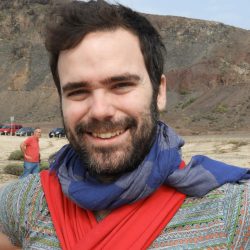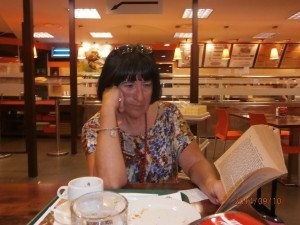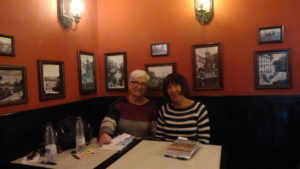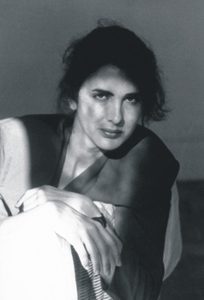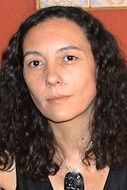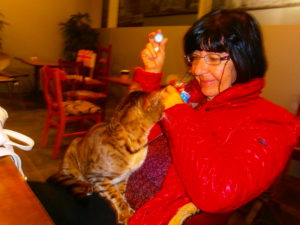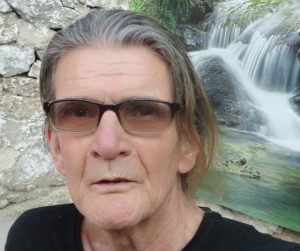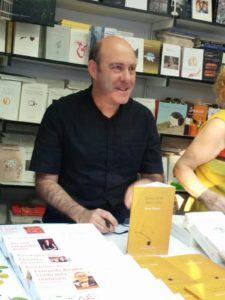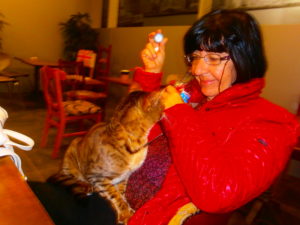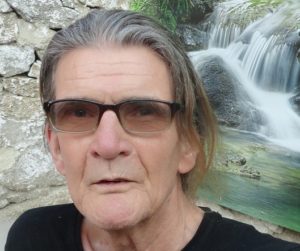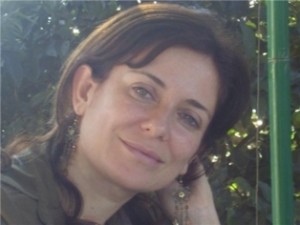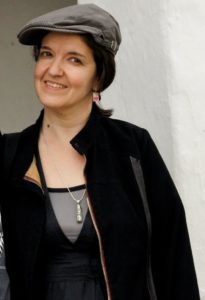CASTILLA X
i.
Grandes segadoras trabajan en los campos mientras aviones cruzan el cielo, lentamente, sobre ellos.
ii.
Las mismas montañas se alzan en lontananza sin embargo otros vehículos ruedan por los caminos.
iii.
Donde antes fue la bestia, hoy es el motor mientras el hombre es el mismo que siembra, cosecha y muere.
CASTILE X
i.
Large harvesters crop the fields as aeroplanes slowly cross the skies above them.
ii.
The same mountains rise in the distance even though other vehicles run the roads.
iii.
Where it was the beast before, now it’s the engine, whereas man, who sows, reaps and dies, remains the same.
CASTILLA XI
i.
Campos de amapolas en los llanos de Castilla.
ii.
Como islas rojas en medio de la marea verde que los circunda.
iii.
Primavera muy lluviosa. Resplandece el llano en el trigo y los cultivos.
iv.
En las flores silvestres, que siguen creciendo junto a los castillos.
CASTILE XI
i.
Poppy fields on the plains of Castile.
ii.
Like red islands surrounded by a green tide.
iii.
A very rainy spring. The plains glisten through the wheat and crops.
iv.
As well as the wild flowers, that still grow beside the castles.
CASTILLA XII (*)
i.
Aun se siembra el trigo en los márgenes de la gran ciudad.
ii.
Que refulge y palpita, confundiendo sus luces con las del ocaso.
iii.
Ya no es la mano del hombre la que siega el trigo.
iv.
Que sin embargo sigue creciendo, enhiesto, en dirección al cielo.
____
A José Viñals, in memoriam.
CASTILE XII (*)
i.
Wheat is still sown on the outskirts of the big city.
ii.
Gleaming and palpitating it mixes its lights with dusk’s.
iii.
Now it’s no longer the hand of man that harvests the wheat.
iv.
That nevertheless still grows straight towards the sky.
_________
(*) To José Viñals, in memoriam
***
CASTILLA XIV
i.
Día nublado en el verano de Castilla:
ii.
inusual como los aviones, de los que ahora solo existe el sonido.
iii.
Gentes van y vienen por las plazas de los pueblos:
iv.
que languidecen o reviven, según desde donde se los mire.
CASTILE XIV.
i.
A cloudy day in the summer of Castile:
ii.
as unusual as the aeroplanes, whose sounds now only exist.
iii.
People come and go through the squares in the small towns:
iv.
that wilt or revive according to the point they’re observed from.
CASTILLA XV
i.
Aun pastan ovejas en los prados de Castilla.
ii.
Y en los campos de rastrojos, ya en la meseta o circundados por colinas.
iii.
Suenan los mismos cencerros que los castillos han oído desde nacer.
iv.
Que oyeron antes las ruinas romanas, hoy circundadas por los nuevos molinos de metal.
CASTILE XV
i.
Sheep still graze on the pastures of Castile.
ii.
And in the bundle stacked fields, whether on the flatlands or the surrounding hills.
iii.
The same sheep-bells heard by the castles ever since their birth still sound.
iv.
Heard before the Romans and their ruins now surrounded by new steel mills.
CASTILLA XVI
i.
La disciplina del cereal y del olivo dotando de su rigor a los campos de Castilla.
ii.
Las sierras no formando mares sino alzándose como cuchillos que dividen las llanuras.
CASTILE XVI
i.
The discipline of the cereal and the olive tree endowing the fields of Castile, its rigour.
ii.
Ridges not forming seas but rising like knives dividing the plains.
***
CASTILLA XIX
i.
Es invierno y nieva en las sierras de Castilla.
ii.
El manto blanco, sin embargo, no llega a cubrir el pardo que domina en el paisaje.
iii.
En el llano, no obstante, las cepas son apenas vestigios en la superficie de una gruesa capa blanca.
iv.
Y en la autopista, los quitanieves trabajan a destajo para abrir un solo carril.
CASTILE XIX
i.
It’s winter and it snows on the sierras of Castile.
ii.
It’s white shroud, however, fails to cover the grey that dominates the landscape.
iii.
On the plains though, stumps of vine remain as vestiges capped in a thick white .
iv.
And on the motorway, snow ploughs work without respite merely to open a single lane.
LOS POEMAS DEL HIELO IV
i.
Aun existe el ocaso en los espejos retrovisores.
ii.
Delante, la luna se alza sobre un cielo azul oscuro.
iii.
Es el mismo vehículo el que rueda por la autopista y la carretera comarcal.
iv.
Y el que conduce, a bordo del coche y de sí mismo.
THE ICE POEMS IV
i.
Dusk still exists in the rear view mirrors.
ii.
Moon is rising on a dark blue sky ahead.
iii.
It’s the same vehicle that rides the motorway and the byway.
iv.
As is the driver who boards both car and himself.
VARIACIONES SOBRE UN POEMA SIN TITULO DE DAMSI FIGUEROA.
i.
Tres toros blancos corrían por tu sueño.
ii.
Golpeaban tu mejilla con arena.
iii.
Florecían cardos en una pradera amarilla que llegaba hasta el mar.
VARIATIONS ON AN UNTITLED POEM OF DAMSI FIGUEROA
i.
Three white bulls ran through your dream.
ii.
Beating your cheek with sand.
iii.
Thistle bloomed in a yellow prairie ending in the sea.
AEROPUERTO
i.
Se incendia el cielo en los ventanales del aeropuerto.
ii.
Mientras, aviones van y vienen apareciendo y desapareciendo entre las nubes.
iii.
Autobuses, furgonetas y pequeños tractores bullen en las pistas.
iv.
Mientras, los viajeros caminan y desaparecen al entrar en las pasarelas.
AIRPORT
i.
Sky burns in the airport windows.
ii.
Meanwhile, planes go back and forth appearing and disappearing amidst the clouds.
iii.
Buses, trucks and small tractors bustle in the tracks.
iv.
Meanwhile, travellers walk and disappear entering the ramps.
AEROPUERTO I
i.
Cae la noche en los ventanales del aeropuerto.
ii.
Ahora los aviones son puntos luminosos en un cielo negro y uniforme.
iii.
Gentes y vehículos mantienen su actividad cíclica e interminable.
iv.
Mientras, los altavoces emiten mensajes no siempre comprensibles.
AIRPORT I
i.
Night falls in the airport windows.
ii.
Planes now are luminous spots in a dark and motionless sky.
iii.
People and vehicles maintain their cyclical and endless routine.
iv.
Meanwhile, speakers deliver not always understandable messages.
***
THE PICKAXE AND THE WORM (*)
The pickaxe can cut the worm but chooses not to do it, putting him gently aside.
(*) Almost from William Blake
***
Escenas. Scenes.
i.
Un hombre solitario, camina en línea recta mientras un incendio, a sus espaldas, calcina su presente;
su presente que se elonga, calcinado, mientras los pasos se repiten, rítmicamente, ajenos a toda sensación térmica o corporal.
i.
A solitary man proceeds in a straight line whilst a fire behind him burns to ashes his present,
a present that as it stretches is burnt to ashes, whilst his steps rhythmically repeat themselves, detached from any thermal or corporal sensation.
ii.
Una mujer, a lo lejos, realiza el trayecto mas lento entre el horizonte y las nubes de sus ojos;
nubes a medio camino entre el horizonte y la bruma, cerebral, que impregna de amarillo el espacio entre el horizonte y sus propios ojos.
ii.
A woman in the distance travels a slower trajectory between the horizon and the clouds in her eyes,
clouds halfway between the horizon and the cerebral haze which impregnates yellow space between the horizon and her own eyes.
iii.
La visión de un gato, absorto, tenso en la potencia que lo habita:
que dibuja una ventana en cada muro; que convierte en hipotenusa cada movimiento del gato, tenso, absorto en la visión de su propio movimiento.
A Juan Luis Martínez.
iii.
The cat’s vision, absorbed, tense in the power that inhabits him:
a vision that draws a window on each wall; and that turns into hypotenuse each movement of the cat, tense, absorbed in the vision of its own movement.
To Juan Luis Martinez.
iv.
Un automóvil, abandonado, viaja sin pausa por una larga carretera;
una costanera interminable por la que el automóvil vaga, ensimismado, con dos soles sobre el horizonte como testigos oculares.
iv.
An automobile, abandoned, travels non stop the long motorway:
an endless esplanade, where the automobile roams engrossed with two suns on the horizon as ocular witnesses.
Escenas 1 Scenes 1
i.
Un hombre, a la distancia, pareciera caminar en círculos mientras a su espalda, las huellas dibujan un trazado ortogonal:
trazado que se extiende, circular, mientras sus pasos se alejan, ajenos a toda intención geométrica o lineal.
i.
A man, in the distance, would seem to walk in circles, whilst at his back his tracks draw an orthogonal sketch:
a sketch that extends circularly as his steps walk away, oblivious to any geometrical or linear intention.
ii.
Una mujer, entre la bruma, pareciera dibujar el horizonte con sus pasos sobre la arena:
trayecto lineal, hipnótico, donde los ojos son un recuerdo borroso que tiñe de amarillo cuanto existe en la memoria.
ii.
A woman amidst the mist would seem to draw the horizon as if with her steps on the sand:
a hypnotic linear trajectory, where the eyes are a blurred memory tinting in a yellow haze all what can be remembered.
iii.
Un gato, absorto, se solaza con la visión de su propio movimiento.
desplazamiento lineal que elimina muros, obstáculos, oxidando en su fuerza cuanto se interpone entre el gato y su visión.
iii.
Absorbed, a cat takes pleasure in the vision of its own movements:
a linear displacement that eliminates walls and obstacles, oxidising in its strength,
all that stands between the cat and its vision.
iv.
Un barco, a la deriva, se deja adormecer por la trama rítmica de la marea:
secuencia de olas a medio camino entre la costanera y el horizonte, entre los que el barco agota sus posibilidades de existir.
iv.
Lulled by the rhythmic weavings of the tide, a boat drifts drowsily:
wave sequences, midway between the esplanade and the horizon, where the boat exhausts its possibilities to exist.
Escenas 2 Scenes. 2
i.
Un hombre, bajo la lluvia, camina sin detenerse hasta que el agua, gota a gota, moja su mirada:
mirada húmeda que ve cargado de amarillo el espeso cielo gris del centro del invierno
i.
In the rain a man walks non stop until the water drop by drop wets his gaze:
a wet gaze that sees charged by yellow the dense grey sky of the winter’s core.
ii.
Una mujer, bajo el cielo del invierno, no detiene sus pasos que la acercan a las nubes:
sucesión de nubes grises entre las que la mujer se detiene, con sus pies sobre la arena
ii.
A winter’s sky doesn’t stop a woman’s footsteps beneath bringing her closer to the clouds:
a succession of grey clouds that stay between the woman with her feet on the sand.
iii.
Un árbol, desnudo en el invierno, enseña al viento su estructura:
a un geómetra, que encuentra en ella el sentido de la vida.
iii.
Stripped by winter, a tree shows the wind its structure:
to a geometrician, who finds in it the meaning of life.
iv.
Las luces de su arboladura son los únicos puntos visibles de un barco, entre la niebla de la bahía:
luces que se confunden con las del tendido eléctrico de la ciudad, apenas unos metros mas arriba.
iv.
Rigging lights are the only visible points of a ship in the fog of a bay:
lights which get confused with a city’s electric lights suspended just a few meters above.
Escenas 3. Scenes. 3
i.
Un rostro, desvaneciéndose, aun conserva rasgos que lo vinculan a la especie:
pertenencia laxa, cuya disolución a la luz de la tarde pone en jaque a la especie, que lo ignora, embotada en su rutina.
A Foucault
i.
A fading face still retains traits that link it to its specie:
a lax belonging, whose late afternoon dissolution checkmates the specie, which, dulled by routine, it’s unaware of.
To Foucault
ii.
Los anos del hombre desintegrándose, espasmódicamente, mientras sus huellas se acercan a los dominios del arquetipo;
territorio geométrico, sin edad, que encanta la consciencia y troquela los anos del hombre.
ii.
The years of man disintegrate in spasms as his footsteps approach the domain of the archetype;
in an ageless geometrical territory delighting consciousness and indenting the years of man.
iii.
Una calle dando tumbos, ebria, entra en el vértigo de un viaje circular:
que desorienta a las puertas, psicoactivándolas, haciendo lineal el trayecto de pajeros y peces que deambulan por la calle, delirante, en el cenit del periplo
iii.
A street staggers along inebriated entering the vertigo of a circular journey:
disorientating, psychoactivating doorways, turning lineal the trajectories of birds and fish that roam the street deliriously in the zenith of the trip.
iv.
Un espejo, al fondo de un pasillo, es desbordado por los destellos de una imagen triangular;
triangulo equilátero, evanescente, que entrega su identidad al espejo aferrándose, difusamente, a un vago anhelo de eternidad.
A Borges
iv.
A mirror at the end of a corridor is overwhelmed by the glimmers of a triangular image;
an evanescent equilateral triangle surrendering its identity to the mirror clutching dimly a vague desire for eternity.
To Borges
LOS POEMAS DEL HIELO. THE ICE POEMS.
i.
El cielo solo existe en los espejos retrovisores. Delante, el asfalto se extiende sin fin aparente troquelado por el ritmo hipnótico del trazado discontinuo.
El sol es un detalle. Solo uno más para el que rueda por el asfalto mientras el cielo sigue existiendo únicamente en el cristal de los espejos.
i.
The sky only exists in the rear view mirrors. Ahead, the asphalt extends without apparent end indented by the hypnotic rhythm of the continual broken road lines.
The sun is a mere detail to he who rolls on the asphalt as the sky goes on existing only in the glass of the mirrors.
ii.
La carretera solo existe en la retina del viajero. Fuera, rueda y asfalto son una unidad que constituye en sí misma el movimiento.
El ojo reconoce apenas borrosas señales de ruta mientras la retina vaga por otros campos. Por otros áreas de la conciencia en movimiento.
ii.
The motorway only exists in the retina of the traveller; outside wheel and asphalt are a unit, which constitutes itself as the motion.
The eye recognises only blurred route signs, as the retina wanders in other fields, other areas of consciousness in motion.
iii.
El silencio sincopado del habitáculo de un coche define la existencia del conductor, cuya presencia otorga sentido a la maquina.
Un sentido que se entremezcla con el trazado discontinuo, con el sol que incide sobre el y con el conductor, definido entre el silencio y la sincopa.
iii.
The syncopated silence of the car’s compartment defines the existence of the driver, whose presence gives sense to the machine.
A sense that blends the continual broken road lines, the sun on them and the driver defined by silence and syncopation.
iv.
La mirada del conductor de un vehículo que rueda. Su extensión en un área delimitada por el horizonte y el trazado discontinuo.
Por el sol al fondo. Vórtice que define la existencia del conductor, de su mirada y la del vehículo que rueda.
iv.
The driver’s sight in a rolling vehicle, its range on the area marked by the horizon and the continual broken road lines;
by the sun, afar, a vortex that defines the driver’s existence, his sight and the rolling vehicle.
v.
El asfalto de la carretera como requisito necesario del movimiento. Su existencia
pétrea definiendo a un individuo.
Sujeto que viaja, insomne, consciente de deber su existencia al movimiento engendrado por la interacción del asfalto y de la rueda.
v.
The asphalt of a motorway being a necessary requirement for motion, whose stony surface defines an individual.
A sleepless subject, who travels aware it owes its existence to the motion engendered by the interaction of asphalt and wheel.
vi.
El movimiento de un vehículo solo existe entre el trazado discontinuo y el sol, que define la presencia de lo visible.
Movimiento materializado en la consciencia a través de la retina, en le que el sol troquela cuanto tiene posibilidad de existir.
vi.
The motion of a vehicle only exists between the continual broken lines and the sun defining the presence of what is visible.
A motion materialised in consciousness through the retina, in which the sun impresses all possibilities of existence.
vii.
La noción de un conductor y de una máquina. De su desplazamiento sobre el asfalto blando de una carretera.
Incisión de una marca en el asfalto. Huella que definirá la presencia de conductor, maquina, asfalto y carretera.
vii.
The concept of a driver and a machine. Their motion over the soft asphalt of the motorway.
Incision of a mark in the asphalt. A trace that will define the presence of the driver, machine, asphalt and motorway.
viii.
La mirada de un sujeto en movimiento sobre la luz, que materializa la presencia de lo real.
La conciencia del conductor que debe su existencia al movimiento y al sol: atravesado en el horizonte por el trazado discontinuo.
viii.
A subject’s sight in motion on light materialises the presence of the real.
The driver’s consciousness, which owes its existence to motion and the sun: crossed on the horizon by the continual broken road lines
VARIACIONES SOBRE FRAGMENTOS DE LA HISTORIA VERADERA DE LA CONQUISTA DE NUEVA ESPAñA, DE BERNAL DIAZ DEL CASTILLO
VARIATIONS ON FRAGMENTS OF THE TRUE HISTORY OF THE CONQUEST OF NEW SPAIN BY BERNAL DIAZ DEL CASTILLO.
i.
Tanta vara y piedra y flecha nos arrojaban, señor, que todo el suelo estaba cubierto de ellas y aun el cielo oscurecían cuando peleábamos de día.
Y derrocaban nuestras murallas, señor, y aunque arremetiéramos reciamente matando treinta o cuarenta de ellos en cada embestida, tan enteros y con mas vigor que al principio acometían.
i.
So many spears, rocks and arrows they hurled at us, my liege, that the ground was covered and even the sky darkened by them as we fought throughout the day.
They knocked down our walls, my liege and though we retaliated stoutly killing thirty or forty at each onslaught, yet as a whole they stormed us with even more vigour than before.
ii.
Sesentiseis de los nuestros nos tomaron en aquel desbarate, señor, y nos herían a todos, tanto a los de a caballo como a los de pie.
Y veíamos como los subían a lo alto del gran templo para sacrificarlos, señor, y los ponían sobre unas piedras delgadas y con grandes navajones de pedernal, les aserraban los pechos y le sacaban los corazones bullentes para ofrecerlos a sus dioses, que allí tenían
ii.
Sixty six of us, they took from that disaster, my liege, both those on horseback and those on foot.
And we saw how they climbed to the top of their great temple to slaughter them, my liege, to lay them on thin stone slabs and with great flint shards sever their breast to draw forth their pulsing hearts as an offering to the Gods they had there.
iii.
Desde lo alto del templo, señor, hacían sonar un gran tambor que se oía en dos leguas, que tenia el sonido mas triste, como instrumento de los demonios:
Y venían muchos escuadrones a echarnos mano y cerraban con nosotros tan reciamente que no aprovechaban estocadas ni cuchilladas; ballestas ni escopetas y daban en nosotros, señor, llenos de heridas y corriéndonos la sangre.
iii.
From the top of the temple, my liege they made a great drum roll you could hear from two leagues, it had a most sad sound, as though an instrument of demons:
they came in many squads closing us in at hand so that neither neither slash nor thrust, shotgun nor crossbow was of avail, and so they struck us, my liege, full of wounds and running in our own blood.
***
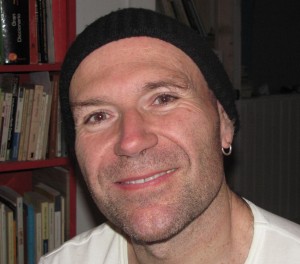
Andres Fisher was born in Washington DC in 1963. At an early age he moved to Chile where he was raised. In 1990 he moved to Madrid, Spain, where he got his PhD and started publishing poetry and related work. Since 2004 he’s back in the US where he teaches at Appalachian State University, Boone, NC, and he still spends 2 or 3 months a year in Madrid. His last book of poetry is Series, collected poetry 1995-2010 (Ed. Amargord. Col. Transatlántica, 2010). In 2009 appeared his bilingual anthology of Haroldo de Campo’s poetry, Hambre de Forma (Ed. 27 letras, Madrid) and in 2010 Caballo en el Umbral, anthology of Jose Viñals’ poetry done collaboratively with Benito del Pliego (Ed. Regional de Extremadura, Mérida). In 2013 appeared Entremilenios (Ed. Amargord. Col. Transatlántica), a translation into Spanish of Haroldo de Campo’s posthumous book. Also in 2013 was released Círculo de Hueso, translations into Spanish of the poetry of Lew Welch (Varasek eds.) done with Benito del Pliego and recently in 2014, they have published Objetos y Retratos. Geografía, translations into Spanish of a sample of Gertrude Stein’s poetry (Ed. Amargord. Col. Transatlántica)
***
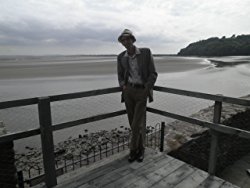
Robin Ouzman Hislop is on line Editor at Poetry Life & Times at Artvilla.com. His numerous appearances include Cold Mountain Review (Appalachian University, N.Carolina), The Honest Ulsterman, Cratera No 3 and Aquillrelle’s Best. His publications are collected poems All the Babble of the Souk, Cartoon Molecules, Next Arrivals & Moon Selected Audio Textual Poems. A translation from Spanish of poems by Guadalupe Grande Key of Mist and Carmen Crespo Tesserae, the award winning (X111 Premio César Simón De Poesía), in November 2017 these works were presented in a live performance at The International Writer’s Conference hosted by the University of Leeds. UK. A forthcoming publication of collected poems Off the Menu is expected in 2020
You may visit Aquillrelle.com/Author Robin Ouzman Hislop about author. See Robin performing his work Performance (University of Leeds)

